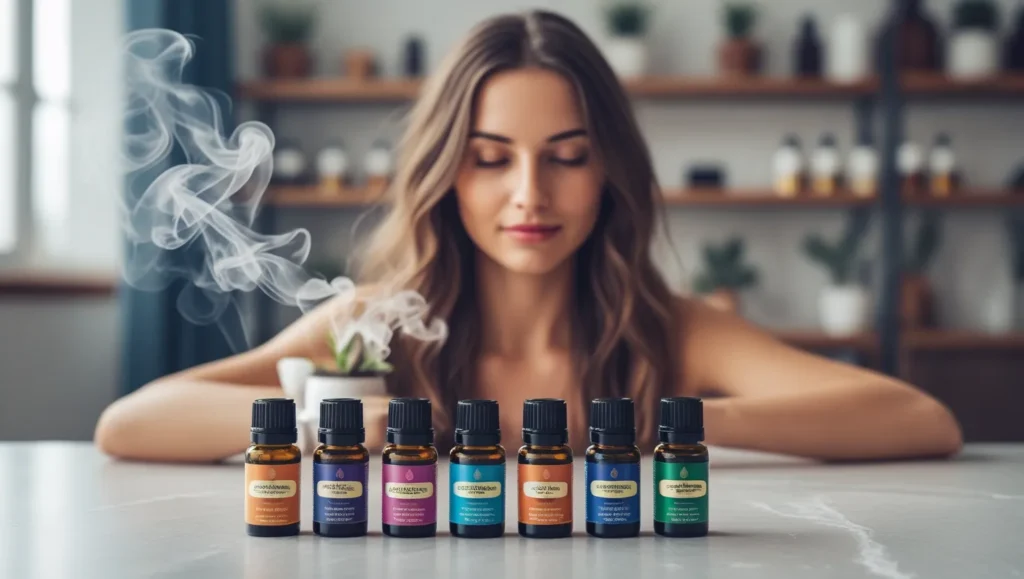Science Behind Aromatherapy and Mental Relaxation
Aromatherapy, the practice of using essential oils for therapeutic purposes, has gained popularity as a natural remedy for stress relief and mental relaxation. From ancient civilizations to modern wellness practices, aromatherapy has been Science Behind Aromatherapy and Mental Relaxation embraced for its potential to promote emotional well-being. But what is the science behind aromatherapy, and how does it influence our minds? Let’s explore the fascinating connection between essential oils and mental relaxation.
Understanding Aromatherapy
Aromatherapy involves the use of plant-derived essential oils that are extracted from flowers, leaves, stems, bark, or roots. These oils contain aromatic compounds that have therapeutic properties. When inhaled or applied to the skin, these compounds can stimulate our senses and evoke physiological and psychological responses.
The practice of aromatherapy is often used in conjunction with other relaxation techniques, such as meditation, yoga, or massage therapy, to enhance its calming effects. The versatility of essential oils makes them an accessible and effective choice for those seeking natural ways to reduce stress and improve their mental state.
The Olfactory System: The Gateway to Relaxation
The science of aromatherapy primarily revolves around the olfactory system, which is responsible for our sense of smell. When we inhale essential oils, the odor Science Behind Aromatherapy and Mental Relaxation molecules travel through the nasal cavity and bind to olfactory receptors located in the nose. These receptors send signals directly to the brain’s limbic system, the region that governs emotions, memories, and mood.
Unlike other sensory systems, the olfactory system has a direct pathway to the brain’s emotional centers, including the amygdala and hippocampus. This direct connection is why certain scents can trigger powerful emotional responses and vivid memories. For example, the smell of lavender may evoke feelings of calm and relaxation, while citrus scents like lemon or orange may energize and uplift the spirit.
Essential Oils and Their Effects on the Mind
Different essential oils are known to produce specific psychological effects. Here are some commonly used essential oils and their associated benefits:
- Lavender: Known for its calming properties, lavender essential oil is often used to reduce anxiety, stress, and insomnia. Studies suggest that inhaling lavender can lower cortisol levels, the hormone associated with stress.
- Chamomile: Chamomile oil is revered for its soothing and relaxing effects. It can help alleviate symptoms of depression and anxiety, promoting a sense of tranquility.
- Bergamot: Extracted from the peel of bergamot oranges, this citrus oil is uplifting and can reduce feelings of sadness and fatigue. It is often used in stress management and mood enhancement.
- Peppermint: While primarily used for its invigorating properties, peppermint oil can also help reduce mental fatigue and improve focus and clarity.
- Ylang Ylang: Known for its exotic floral fragrance, ylang-ylang oil is used to alleviate tension, anger, and stress. It promotes a sense of relaxation and emotional balance.
The Role of Neurotransmitters in Aromatherapy
Aromatherapy’s calming effects are also linked to the release of neurotransmitters in the brain. When essential oils are inhaled, they can influence the production of serotonin, dopamine, and gamma-aminobutyric acid (GABA). These neurotransmitters play a key role in regulating mood and promoting relaxation.
- Serotonin: Often referred to as the “feel-good” neurotransmitter, serotonin contributes to feelings of happiness and well-being. Essential oils like lavender and chamomile can stimulate serotonin production.
- Dopamine: Responsible for pleasure and reward, dopamine levels can be Science Behind Aromatherapy and Mental Relaxation enhanced by uplifting scents like citrus oils.
- GABA: This inhibitory neurotransmitter reduces anxiety and calms the nervous system. Oils like ylang-ylang and frankincense have been shown to enhance GABA activity.
Methods of Using Aromatherapy for Mental Relaxation
There are several ways to incorporate aromatherapy into your relaxation routine:
- Inhalation: The simplest method is to inhale essential oils directly from the bottle or through a diffuser. Diffusing essential oils in a room creates a calming atmosphere and provides continuous aromatherapeutic benefits.
- Topical Application: Diluted essential oils can be applied to the skin using carrier oils like coconut or jojoba oil. Massaging oils onto the temples, wrists, or behind the ears allows for both absorption and inhalation.
- Bathing: Adding a few drops of essential oil to a warm bath can create a spa-like experience, promoting relaxation and relieving muscle tension.
- Compresses: Soaking a cloth in water infused with essential oils can be used as a warm or cold compress to reduce stress and soothe headaches.
Scientific Evidence Supporting Aromatherapy
Numerous studies have explored the effects of aromatherapy on mental health. Research suggests that inhaling certain essential oils can reduce stress, anxiety, and depressive symptoms. For example:
- A study published in Evidence-Based Complementary and Alternative Medicine found that lavender essential oil had significant anxiolytic (anxiety-reducing) effects in patients with anxiety disorders.
- Another study in the Journal of Clinical Psychiatry demonstrated that bergamot essential oil inhalation improved mood and reduced stress in Science Behind Aromatherapy and Mental Relaxation participants.
- A review in Frontiers in Behavioral Neuroscience highlighted the role of essential oils in activating the parasympathetic nervous system, which promotes relaxation and reduces stress responses.
Final Thoughts
Aromatherapy offers a natural and effective way to relax the mind, reduce stress, and enhance overall well-being. By engaging the olfactory system and influencing neurotransmitter activity, essential oils provide therapeutic benefits that support mental relaxation.
Whether used through diffusers, massages, or bath rituals, aromatherapy is a Science Behind Aromatherapy and Mental Relaxation versatile tool that can be incorporated into your daily routine. With its rich history and growing scientific support, aromatherapy remains a valuable practice for achieving mental tranquility and emotional balance. Give it a try, and let the soothing scents guide you to a state of relaxation and inner peace.

